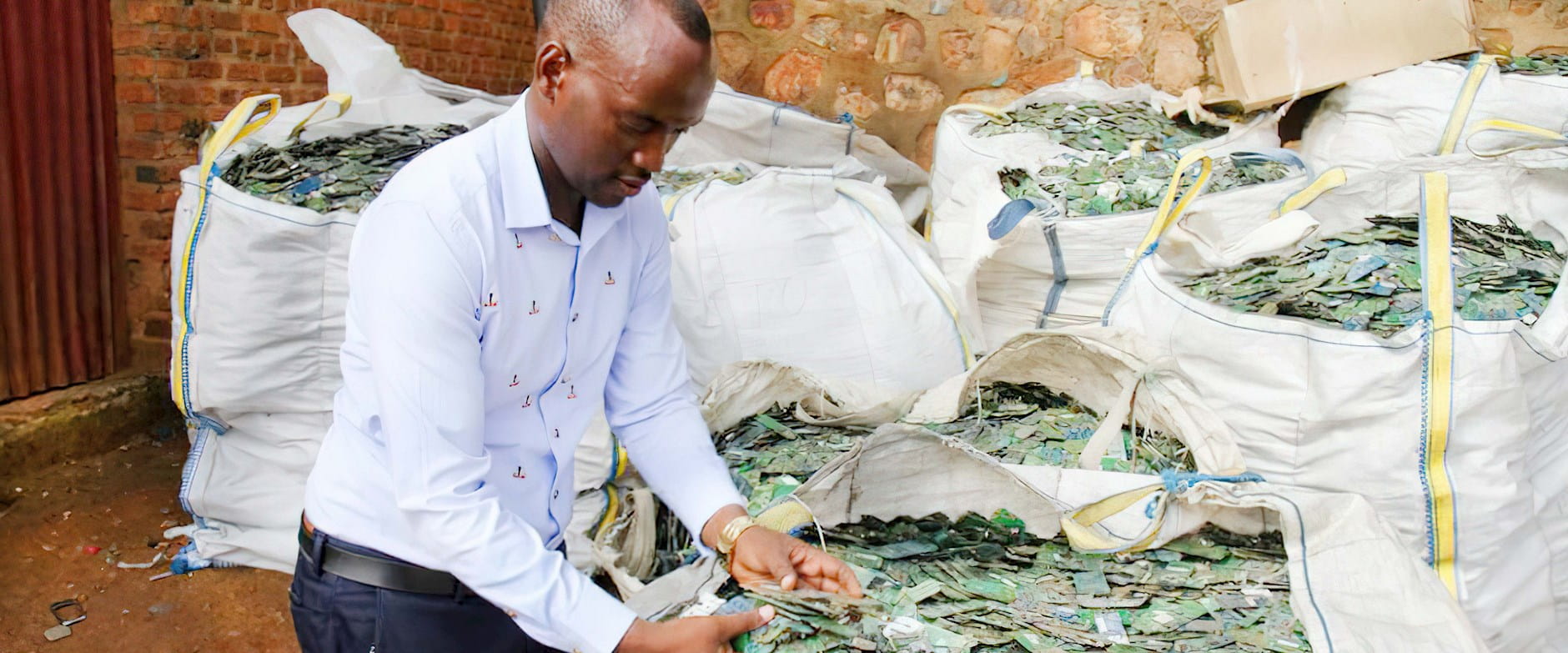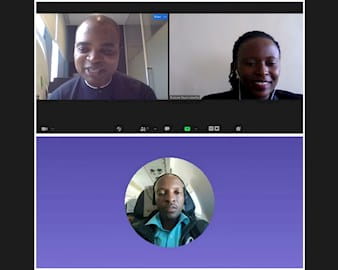
Global Launchpad: Scaling Social Impact in Hong Kong
Ten mission-driven ventures pitch ice-cream, education, and more.
Global Launchpad: Scaling Social Impact in Hong Kong

Rwandan entrepreneur Gabriel Mushimiyimana had a feeling his product, a chili oil called “piri piri”, would be a hit in Kenya. He just didn’t have any data to back it up.
Through a program that matches small business founders in Africa with remote coaches, he was able to validate his hunch with the help of University of Chicago Booth School of Business alumnus Fernand Lendoye, ’06.
“We spent time researching and analyzing the number of households of chili consumers, as well as potential consumers, and we found that 60 percent of households in Kenya could be our customers,” Mushimiyimana said. “Before, I didn’t know this. I was running my business blind."
Chicago Booth’s Rustandy Center for Social Sector Innovation launched the new program in partnership with Grow Movement, a UK-based nonprofit that pairs volunteer international business professionals with entrepreneurs in East Africa to help them build their businesses. The pilot leveraged the on-the-ground expertise and network of Grow Movement with the skills of Booth alumni wanting to give back.
“I’m originally from Gabon in central Africa,” said Lendoye, whose day job is managing director at Singapore’s Brightriver Capital. “This program was an avenue that combined my interest in being involved in Booth and being able to contribute my experience and knowledge back to the African continent.”
From July to December 2020, 27 alumni were matched with 27 Rwandan business owners for virtual coaching every one-to-two weeks. The Booth alumni, who volunteered from across the U.S., Germany, Italy, Singapore, and the United Kingdom, worked with entrepreneurs to develop business plans, strategies to grow sales and profits, and plans to pivot because of COVID-19.
“African economies have been severely affected by the pandemic, which has compounded an already huge economic challenge,” said Violet Busingye, executive director of Grow Movement, which provides entrepreneurs and coaches with in-country program managers that share important cross-cultural insights. “The pilot program this fall was a huge success. The volunteer Booth graduates absolutely have the tools to help create meaningful impact in these emerging market communities.”
Lendoye credits Booth’s grounding in analytic rigor with enabling him to assist Mushimiyimana and his business.
“We needed to build a common fact base and figure out a price point,” Lendoye said. “My MBA prepared me to be comfortable going in and finding a way to identify the issues and make recommendations for action.”
“At the end of the day, it’s all about strategy. Not only that, it’s really about personal strategy and how you become your own teacher,” Lendoye said. “I wanted to make sure Gabriel felt confident that he could replicate this type of work and analysis on his own in the future. That’s what coaching and mentoring should be about.”
Research by Booth’s Pradeep Chintagunta, the Joseph T. and Bernice S. Lewis Distinguished Service Professor of Marketing, showed that remote coaching does make a difference. His research, which was supported by the Rustandy Center and will be featured in a forthcoming Journal of Marketing issue, not only confirms the viability of the remote coaching model; it also suggests that volunteer remote coaching is scalable and can be an effective intervention for fighting poverty in emerging markets.
In a randomized controlled study conducted in association with Grow Movement, Professor Chintagunta and his coauthors randomly assigned 530 remote coaches from 60 countries to 530 Ugandan firms (selected randomly from a sample of 930 firms). The coaches advised the entrepreneurs during weekly, one-hour Skype meetings over the course of six months.
Compared to the control group of 400 firms, who did not receive any coaching, entrepreneurs helped by coaches grew monthly sales by 27 percent. Further, research showed 63 percent of entrepreneurs were more likely to pivot or shift marketing strategies than controls. In a subsequent study specifically analyzing coaches who specialized in marketing, monthly sales increased by 51 percent, on average, while monthly profits grew by 35.8 percent, and total assets by 31 percent.
Jan Miecznikowski, ’93, a long-time consultant at Booz Allen Hamilton and Booz & Company turned tech startup investor and advisor in Illinois, worked with an entrepreneur who runs an organic fertilizer business on segmenting his audiences (farmer, distributor, government, investor) and tailoring product messaging to each group. While at Booth, Miecznikowski worked in Poland as part of an exchange program, which was formative in how he thinks about working with entrepreneurs.
“Back then, Poland was a world where there were very smart people, but they were in a very messed up system, and had not been exposed to various business concepts, ” he said. “I don’t think I would have been as effective in my career, and now, had Booth not put me on the path to having that experience.”
Tania Sahai, ‘04, who lives in San Francisco but spent a few years in Malawi as a child, was glad to give back and learn about Rwanda in the process.
“When working, we tend to be in bubbles even if we try not to be, so this was a wonderful opportunity to get out of my bubble and learn about what’s going on in Rwanda,” she said, noting that her time at Booth taught her how crucial it is to ask the right questions and how important this skill proved to be as she collaborated with an entrepreneur running a digital marketing services startup.
Planning for the Rustandy Center pilot began before the pandemic, with the idea of offering alumni globally the chance to gain experience working in emerging markets while collaborating with small business owners who often are short on time or resources.
“The program perfectly combines two cornerstones of the center’s mission: to help alumni leverage their skills for social impact and to support research focused on understanding how the social sector operates,” said Caroline Grossman, ’03, executive director of the Rustandy Center and adjunct assistant professor of strategy at Booth.
“Since this pilot is based on research, we knew that Grow Movement’s model had an impact on the entrepreneurs and their businesses, and we’ve seen time and again that these types of volunteering experiences can be such valuable two-way partnerships, as our alumni often incorporate some of what they learn into their own work practice. We were thrilled to support this research, our alumni, and Rwandan entrepreneurs, especially during a time that’s challenging for so many individuals and small businesses.”
Although his research was done well before the COVID-19 crisis, Professor Chintagunta thinks the virtual coaching model will be even more in demand due to the constraints of the global pandemic.
“Given the number of small businesses struggling to survive, and the potential downtime some executives might be having due to time saved on commuting and travel, now would be a good time to skill-up these entrepreneurs so they can take on the challenges awaiting them once the economy starts shifting back into high gear,” he said.
Mushimiyimana's chili oil business is exemplary of this. The pandemic has closed the border between Rwanda and Kenya, so he cannot transport the raw chili material for processing and sales in Kenya. Despite the hold on production, participating in the pilot program has given him the tools to plan for the future.
“I used this time to take a step back to better plan for the business, which I believe will help us pivot and grow,” he said. “I feel we’re prepared for the post-pandemic recovery.”
Interested in learning more about the Grow Movement pilot program? Reach out to the Rustandy Center’s Ali Galloway for more information or sign up to get the latest Rustandy Center news.

Ten mission-driven ventures pitch ice-cream, education, and more.
Global Launchpad: Scaling Social Impact in Hong Kong
Rustandy Center research partnership aims to develop supply chain, deliver health supplies in Democratic Republic of Congo.
Research to Practice: Booth Professor, Alumna Team up to Fight Malaria
Booth student Rani Patel shares her experience as a participant in the Chart Your Path to Social Impact workshop.
Student Perspective: How I Charted My Path to Social Impact